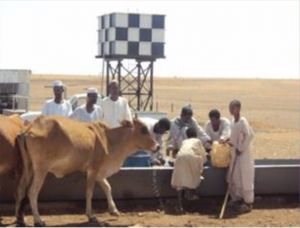The Sahelian region is experiencing the full impact of climate change with rainfall deficits and severe droughts with devastating consequences on people’s livelihoods, the region is one of the most severely affected from land degradation and desertification in the world. It has experienced severe drought and increasing deterioration of soil quality and vegetation cover and the scarcity of natural resources has led to conflict and migration. More than elsewhere, in the Sahel these natural disasters are degrading the natural resources essential to the agropastoral livelihoods that underpin the economy in much of the area 80 to 90 percent of the population actively engage in agriculture. Drought deteriorates land causing it to lose its fertility. Insufficient rain-fed irrigation means that crops fail or are destroyed, while livestock struggle to find water for drinking.
In order to tackle the climate-driven challenges, countries in the Sahel region have laid out their national priorities to adapt to climate change and committed to limit the impacts of climate change through specific adaptation measures. The proposed project proposal focuses those sectors that have been identified as being of national adaptive importance for both countries, namely agriculture, water resources, livestock and land resources.
The project objective is to strengthen the regional agro-ecology and sanitation resilience to climate change and COVID-19 in the border area between Chad and Sudan. This will be achieved by enhancing regional water mapping, monitoring and governance capacity to better adapt to drought events; by improving water availability, water use efficiency; promoting adaptive agriculture production systems and multipurpose water technologies for improved livelihoods, food security and sanitation of rural households; and developing a Regional Natural Resource Management Plan.
By adopting a regional approach, the project will enable the two countries to reap the full benefits of the potential spill-over effects of a shared scale-up strategy in the most cost-effective way. A regional approach for irrigation development will help: (a) facilitate coordinated investment planning in shared natural resource areas; (b) build the knowledge base and facilitate cross-learning at the regional level; and (c) facilitate the development of regional and national policies.
In total the project will target around 23,000 direct beneficiaries plus and additional 115,000 indirect as household members (on average around 6 members to a household). Around 20,000 beneficiaries will benefit from learning of climate-resilient rainfed agriculture techniques through Farmer Field Schools that will improve their ability to maximise agricultural productivity and improve soil fertility in harsh climatic conditions.
| Project Component 1: Outreach, Capacity Building, Conflict Resolution and Knowledge Management | US$ 815,000 |
| Project Component 2: Investment in Natural Resource Management and Climate Resilient Community Infrastructure | US$ 6,264,641 |
| Project Component 3: Improving food security through climate-resilient agricultural practices and technologies | US$ 4,228,960 |
| Project Component 4: Enhancing regional cooperation on water resource development- based food security and climate change adaptation in agricultural and policy development | US$ 394,000 |
| Project execution cost | US$ 1,200,625 |
| Total project cost | US$ 12,903,226 |
| FAO Project Cycle Management Fee | US$ 1,096,774 |
| Grant Amount | US$ 14,000,000 |
Project Documents
| Attachment | Type | Size |
|---|---|---|
| Project document | 4 MB | |
| Project concept | 3 MB |



